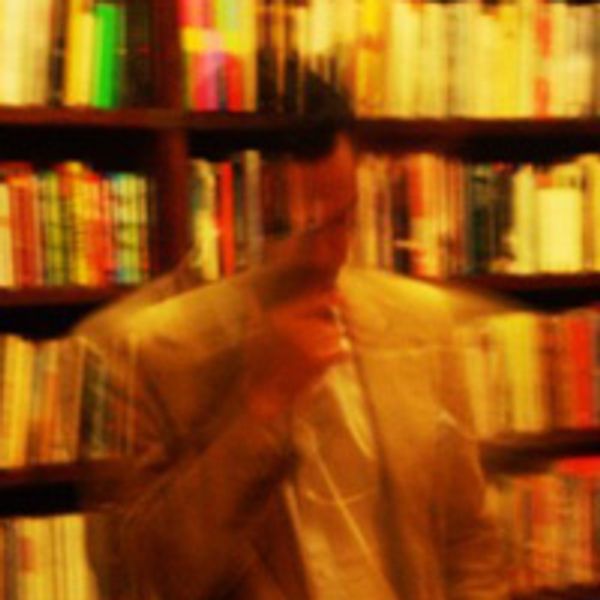Lia Purpura, Bundled Black Walnut (detail), featured in AGNI 102
From Dark to Light: The Poems of Pavel Šrut
Paper Shoes by Pavel Šrut, translated by Ema Katrovas. 131 pgs. Carnegie Mellon University Press, 2009. $17.95.
Richard Katrovas rightly points out in his introduction to Paper Shoes that Novak is a kind of modern soldier Švejk, the wise buffoon created by Jaroslav Hašek (or Jan Hašek, as Katrovas misnames him). Like Švejk, Šrut’s protagonist is wise in spite of himself, a man whose intelligence rests on the fact that he knows he’s a fool (or does he?). Novak is too weathered for Švejk’s boisterous optimism, however. Instead, Šrut’s protagonist more closely resembles Mr. Cogito from Zbigniew Herbert’s masterful Polish poems: an intelligent man battered by tides of chance and loss, kept conscious by occasional gasps of bracing insight.
First steps, first loves, first sexual encounters, the first realization of death: Šrut’s poems grapple with irrefutable turning points, moments when the familiar dissolves. These poems—in Katrovas’s lithe translation—dance between darling adoration of life’s mysteries and expressions of quotidian detail. At the same time, Šrut’s deceptively simple images capture abstract concepts in vivid parables. “The Story of Lust” is one fine example:
Mothers, don’t keep your little boys
from playing in the dark
with a flickering flashlight
For the story of lust
is so simple:
from dark to light
from light to dark
back and forth
This poem, like much of Šrut’s work, hinges on a basic image which is presented and elaborated upon. Šrut’s manipulation of narrative charges his images with a heavy burden of meaning, and it is only thanks to a stunningly clear presentation that these images are able to bear the intellectual weight they carry. In this case, sexuality, perhaps the most complex emotional concept, is synthesized in the image of light and dark, simplifying but not belittling the subject.
The poems in Paper Shoes largely eschew punctuation, lending a seeming lack of finality to Šrut’s narratives. Also, many of the poems rhyme in the original Czech, but Šrut’s work, especially in English translation, is essentially grounded in image. “Story of the Great Sumac Tree” is one example of how Šrut localizes the human condition in Novak, while grounding abstract themes in simple, evocative imagery.
There was a man
A sumac grew rampant behind his house
His wife came and grabbed an ax
His son came and grabbed a shovel
They overcame the sumac
But not death
There was a man
He buried his wife and ax
He buried his son and shovel
He overcame death
But not the sumac
There was a Novak
A sumac grew rampant behind his house
What begins as a banal, almost biblical description takes several surprising, violent turns before concluding in a manner which seems at once ironic and intensely serious. Narrative authority is essential for such serpentine story telling, but Šrut never does the reader’s work. The poem’s images suggest rather than visualize, and contain just enough detail to lend an uncanny familiarity to the narrative, as if it were our own.
Pavel Šrut was unable to publish his poetry for twenty years under communism, despite being considered one of Czechoslovakia’s “official poets” in his twenties during the late 1960s. The nineteen poems contained in the samizdat portion of Paper Shoes capture the tone and tenor of an era which did not exist west of the iron curtain, and as such, are crucial poetic notes from the underground. This poetry is more than historical curiosity, however. An essential volume, Paper Shoes offers English-language readers a glance at the work of a great Czech poet. By expressing the inner life of a classical intellect marooned in communist and post-communist modernity, Pavel Šrut’s poems speak with us, even if they don’t speak for us.
Stephan Delbos is a New England–born poet living in Prague, the Czech Republic, where he teaches at Charles University and Anglo-American University and edits several literary publications, including The Prague Revue. His poetry and essays have appeared most recently or are forthcoming in New Letters, Atlanta Review, Poetry International, Zoland Poetry, and Poetry Salzburg Review. (1/2010)

Stephan Delbos
Stephan Delbos is a New England–born poet living in Prague, the Czech Republic, where he teaches at Charles University and Anglo-American University and edits several literary publications, including The Prague Revue. His poetry and essays have appeared most recently or are forthcoming in New Letters, Atlanta Review, Poetry International, Zoland Poetry, and Poetry Salzburg Review. (updated 1/2010)
